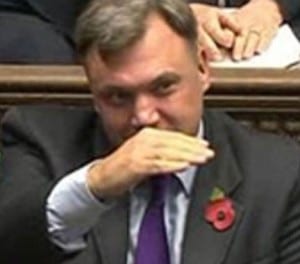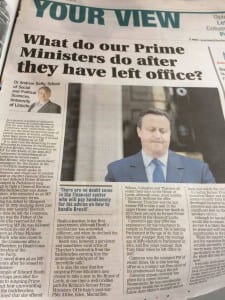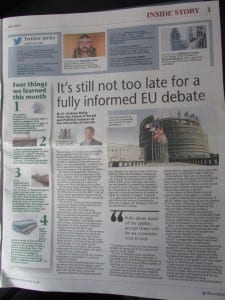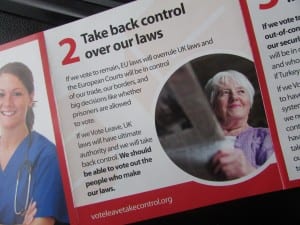 Prime Minister’s Questions is one of the most extraordinary Parliamentary spectacles at Westminster, if not the world. Every week, while Parliament is sitting, the Prime Minister must come to Parliament and subject themselves to thirty minutes, (in recent times quite a lot longer), of questions from both sides of the House of Commons. They receive no advance warning of the subject matter of questions, which can range widely across any area of public policy and beyond. In a recent PMQs, the range of topics on which Theresa May was expected to field questions included NHS spending, the child sex-abuse inquiry, grammar schools, the prospect of a second runway for Gatwick airport, the ivory trade, Chinese ceramic dumping and the dualling of the A303 in Yeovil. While the leader of the Opposition is allowed to ask six questions and the leader of the next largest party, currently the SNP, can ask two, the remaining questions are selected at random from MPs who put their name into the weekly ‘shuffle’ or by a small handful who may be selected by catching the Speaker’s attention in the Chamber. While Opposition questions can be anticipated as designed to challenge or embarrass the government, those from the Prime Minister’s own benches are often designed or ‘planted’ in order to allow the Prime Minister to draw attention to the government’s perceived achievements. While such questions may provide a temporary relief from the onslaught from the other side of the Chamber, the occasional unexpected challenge from one’s own backbenches is not uncommon and may be even more painful.
Prime Minister’s Questions is one of the most extraordinary Parliamentary spectacles at Westminster, if not the world. Every week, while Parliament is sitting, the Prime Minister must come to Parliament and subject themselves to thirty minutes, (in recent times quite a lot longer), of questions from both sides of the House of Commons. They receive no advance warning of the subject matter of questions, which can range widely across any area of public policy and beyond. In a recent PMQs, the range of topics on which Theresa May was expected to field questions included NHS spending, the child sex-abuse inquiry, grammar schools, the prospect of a second runway for Gatwick airport, the ivory trade, Chinese ceramic dumping and the dualling of the A303 in Yeovil. While the leader of the Opposition is allowed to ask six questions and the leader of the next largest party, currently the SNP, can ask two, the remaining questions are selected at random from MPs who put their name into the weekly ‘shuffle’ or by a small handful who may be selected by catching the Speaker’s attention in the Chamber. While Opposition questions can be anticipated as designed to challenge or embarrass the government, those from the Prime Minister’s own benches are often designed or ‘planted’ in order to allow the Prime Minister to draw attention to the government’s perceived achievements. While such questions may provide a temporary relief from the onslaught from the other side of the Chamber, the occasional unexpected challenge from one’s own backbenches is not uncommon and may be even more painful.
The process of a weekly questions to the Prime Minister is an important mechanism for holding the government to account. It ensures that the government cannot ignore Parliament and serves as a regular reminder that, in the UK, it is Parliament that is sovereign. Even Prime Ministers who enjoy a large majority in Parliament freely admit to being daunted by PMQs. The description of the challenges of this weekly engagement in Tony Blair’s memoirs provides one of the strongest defence of the value of PMQs:
PMQs was the most nerve-wracking, discombobulating, nail-biting, bowel-moving, terror inspiring, courage-draining experience in my prime ministerial life, without question… the whole thing is a giant joust, a sort of modern, non-physical duel. The weapons are words, but my God they can hurt, and to devastating effect. For those thirty minutes, the Prime Minister is essentially on the ‘at risk’ register. It is the unpredictability that is so frightening. Sure your own back benches, if they are loyal, let you know the question, but to everyone else, it’s a blood sport and the Prime Minister is the quarry. If it goes well, you feel buoyed; if it goes badly, you feel not simply wretched but humiliated. (Tony Blair, A Journey, p.109)
However, while PMQs is widely viewed as an important democratic process, in practice the spectacle is often decidedly unedifying. MPs on both sides of the House take the opportunity to barrack and bawl at each other and score cheap points with carefully constructed, and only occasionally funny, jokes which will, nonetheless, prompt lengthy and unconstrained laughter in the Chamber. Questions, particularly those from the Opposition leaders, are often prefaced by long statements and in some cases are not even questions at all. The practice of planting sympathetic questions on the government’s own benches undermines the value of this genuine opportunity for parliamentary scrutiny and can lend the whole event the unpleasant pallor of toadying obsequiousness. Moreover, while the Chamber is always packed for PMQs, many MPs are acutely aware of the limitations of exercise and the poor image it presents to the world beyond Westminster. In interviews conducted as part of our research on Parliament and welfare policy, many MPs were critical of the value of PMQs describing it variously as ‘stage-managed’ and ‘a circus’. In contrast, some noted the daily departmental questions, which receives much less media attention, was an important opportunity for detailed scrutiny.
One of the most vocal critics of PMQs is the current Speaker of the House of Commons, John Bercow. Clearly frustrated at the spectacle he is forced to manage, Bercow has described PMQs it as ‘scrutiny by screech’ which is, he argues, damaging the reputation of Parliament.
For most of the public Prime Minister’s Questions is the shop window of the House of Commons. The media coverage of that thirty minute slot dominates all other proceedings in Parliament during the rest of the week. If the country comes to an adverse conclusion about the House because of what it witnesses in those exchanges, then the noble work of a dozen Select Committees will pale into insignificance by comparison… If it is scrutiny at all, then it is scrutiny by screetch which is a very strange concept to my mind… PMQs ha[s] become a litany of attacks, soundbites and planted questions from across the spectrum. It was emphatically not an act of scrutiny conducted in a civilised manner. And this is what the House of Commons has allowed to be placed in what I repeat is the shop window. (John Bercow, speech at the International Centre for Parliamentary Studies, London, 2010)
Many MPs are prepared to accept such criticisms and will pay lip-service to the need for a quieter or more mature approach to PMQs. In contrast, there are few who are prepared to defend the current practices. One notable exception to this is the former Shadow Chancellor, and extraordinary dancer, Ed Balls, who was, until recently, one of the most active practitioners of the dark arts of PMQs. While his recently published memoirs, Speaking Out, don’t necessarily provide a wholehearted defence of the less edifying side of PMQs they do explain the reasoning behind his own actions in the Chamber, when sitting opposite David Cameron at PMQs. He clearly derived satisfaction from his ability to provoke the Prime Minister and also stresses why, in his view, such actions may be necessary:
On television, you never get a sense of how small the House of Commons actually is, how close the opposing benches are to each other, and what a cauldron of noise is created. The microphones pick up only a fraction of what is going on, as do the journalists up in the press gallery. It was perfectly possible, and common, for George Osborne and me to have a whispered chat throughout PMQs exchanges. I’d observe how little David Cameron understood the issues; George would ask in response why then were we unable to lay a glove on him?
Of course, Cameron would also hear what I was saying and would become more and more irate, especially when I had the temerity to address him directly, and ask repeatedly – in the manner of a disappointed schoolmaster – why he didn’t just work harder at his job…
Naturally a small part of me wished I could be in Ed’s shoes, and pose the questions myself… But while I couldn’t ask Cameron questions, I could certainly use my low-level heckling and visible body language at PMQs to put him under pressure: using my outstretched hand to signal that the economy was flatlining, for example – a gesture akin to smoothing a bedsheet.
If you believe you’re born to be prime minister you probably don’t think that anyone else has a right to question the way you do the job, let alone treat you with disrespect… Among the media, his own ministers and MPs, and behind closed doors of Downing Street, Cameron’s temper was even more notorious than Gordon Brown’s. But that was a side if his character that the public rarely got to see, and PMQs became one of the only occasions we could expose it.
I’m absolutely certain he never came into a session on Wednesday intending to say something nasty or patronising… but eventually his inner Flashman would win out… So when Cameron finally lost it, it’s true that it always gave me some temporary satisfaction. (Ed Balls, Speaking Out, pp.345-6)
While Balls was clearly motivated by a desire to expose the Prime Minister he also admits that the actions of Opposition MPs at PMQs may also depend on their own leader’s performance, concluding that:
On days when Ed scored a good hit, I was quieter, but on the days when he didn’t, I’d try to catch Cameron out. If there’s a comparison with close fielders sledging in cricket, it’s that you don’t bother when your spinner is turning them sideways, but you have to try everything when it’s 200-0 on a flat pitch.



